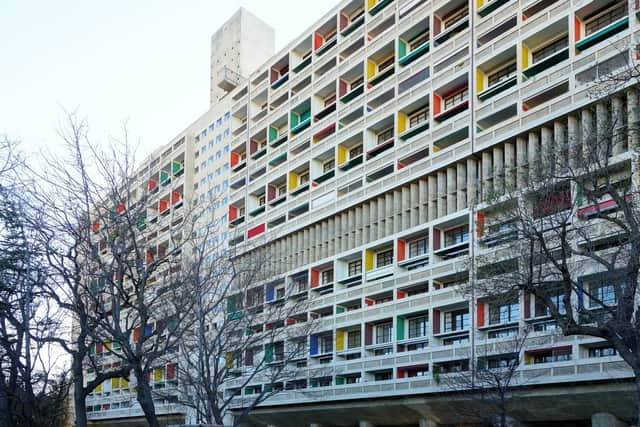Conservatives worship GDP not realising that, as Bobby Kennedy said, it measures everything 'except that which makes life worthwhile' – Stewart McDonald MP
Measuring this happiness “in terms of numbers, of mathematics, of properly calculated designs”, Le Corbusier thought that if homes and cities – which he described as “machines for living in” – were properly designed then the happiness of their inhabitants would be all but inevitable. However, one problem quickly became evident in his planned cities.
That problem was people: people who wanted more from their life than 2,000 calories a day and a home heated to 20C.
Advertisement
Hide AdAdvertisement
Hide AdThe problem was people who did not want to live in perfectly designed high-rise flats in a city with vast public squares the size of a small village and six-lane highways which connected their home to their workplace across the city and linked both to a shopping district with every conceivable shop.
The problem was people who wanted to live somewhere with crowded street markets and narrow lanes where you might bump into a friend, a place where a neighbour might help look after your child or keep your spare house key safe.
They wanted to live next to a café that does good rolls in the morning and near a nice restaurant you could celebrate your birthday in.
However, almost a century on, the policy debate around quality of life seems to have barely moved on. If anything, it has regressed. Too often politicians are stuck in a loop about what people need to get by, when we don’t discuss enough how to deliver a good quality of life for people.


It was 1968 when Bobby Kennedy famously observed that measuring a country’s gross domestic product (GDP) accounts for “everything… except that which makes life worthwhile”.
GDP, he noted, “does not allow for the health of our children, the quality of their education or the joy of their play. It does not include the beauty of our poetry or the strength of our marriages, the intelligence of our public debate or the integrity of our public officials”.
Yet here we sit in 2022, with a Conservative government in Westminster which trumpets two per cent growth in GDP as one of its crowning achievements, despite also presiding over a decade of rising poverty and homelessness and rampant inequality.
No matter that our democratic institutions are creaking under the weight of 12 years of Conservative government and that the planet is slowly becoming unliveable. No matter that housing is increasingly unaffordable, and that people will soon face energy bills that would have been unimaginable a few years ago. As long as GDP is growing, they say, everything is fine.
Advertisement
Hide AdAdvertisement
Hide AdThis argument is unsustainable. As Le Corbusier learned to his cost, there is no surer recipe for misery than trying to reduce the sum of human existence into a graph or bar chart.
A warm home, a full stomach and secure work are the minimum standards that every single person in the world’s fifth richest country should expect. Anything less is a policy failure.
Yet in the United Kingdom now, as people struggle to eat and heat their homes, this year’s Sunday Times Rich List opened with the observation that the “top 250 entries now have more wealth than the entire 1,000-strong list five years ago”. It is clear that, long before the cost-of-living crisis began to bite, something was very wrong with our economic model.
Despite this, the UK establishment remains wedded to an economic model that collapsed around our ears in 2007 and has led to this grotesque maldistribution of wealth and economic power.
And now, as the cost-of-living crisis begins to gnaw at households up and down the country, the UK Government’s biggest ambition for its poorer citizens seems to be for them to eke out a kind of pre-industrial, subsistence living, grateful if they have a full stomach and a warm home.
As we head towards what looks like a very tough winter, the immediate focus must be on mitigating the effects of the coming crisis on the most vulnerable: on making sure that everyone is fed and warm.
But when we do emerge from this – as we will – there must be a greater focus on building an economy that can deliver the little things that make life worth living, as well as the simple necessities.
Every person in this country deserves so much more than what a Conservative government in Westminster is willing to concede to them.
Advertisement
Hide AdAdvertisement
Hide AdScotland has already taken a bold step in this direction, with the Scottish Government’s approach to the economy seeking to deliver well-being through sustainable and inclusive economic growth.
And the Scottish Government’s baby box – which delivers books and a poem to new parents alongside blankets and nappies – is a perfect example of a policy which recognises that our homes and cities are so much more than machines for living in. It’s a small and important step, but we must be bold and go so much further.
An economic model that treats human beings like machines who need nothing more than fuel and maintenance is no longer tenable. As the American poet James Oppenheim reminded us: “Hearts starve as well as bodies: give us bread, but give us roses.”
Stewart McDonald is SNP MP for Glasgow South
Comments
Want to join the conversation? Please or to comment on this article.
